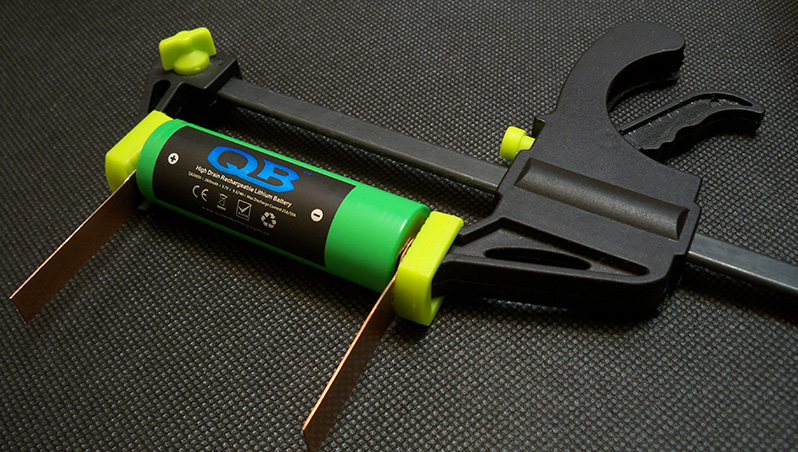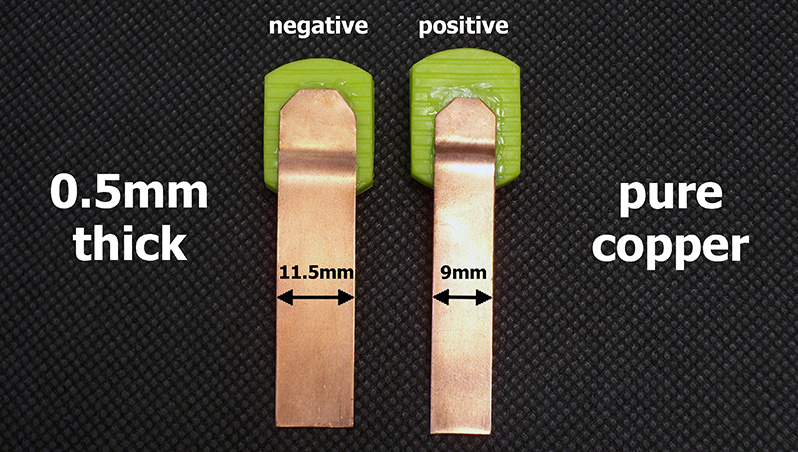thunderheart
Member
- Joined
- Apr 4, 2018
- Messages
- 276
Sony US18650VTC6 (or just VTC6) is a high drain 18650 size Li-ion cell which supports discharge rate up to 15A if no temperature control is used and up to 30A with 80C temperature cut.

The battery was bought from my reliable supplier (Queen Battery) and tested withZKETECH EBC-A20and a self-made battery holder. It's a PC-connected battery tester supporting 4-wire measuring and discharging at up to 20A.

I've used version 3.0 of my battery holder based on 0.5mm thick pure copper terminals


I've followed all the prescriptions of theIEC61960-2003standard concerning battery's capacity measurement. Before each discharging cycle each battery was charged at standard charge current mentioned in its datasheet to charge end voltage. Before each discharging or charging i've held a 1-1.5hrs pause. The environment temperature was 23.0-24.5C. To be sure in results i've done each testminimum twice(usually 3-4 times).
Sony US18650VTC6
The cell is marked as
SE US18650VTC6 C6
G 0400743YF20U

The main specifications from Sony VTC6datasheet:
Rated capacity:3000mAh
Nominal capacity:3120mAh
Nominal voltage:3.6V
Standard charge current:3A (1C)
Charge end voltage:4.20V
Max charge current:5A
Max continuous discharge current:15A (5C) / 30A (10C) with 80C temperature cut
Discharge cut-off voltage:2.0V / 2.5V
AC impedance at 1KHz:8-18m?
Weight:46.61.5g
The measured DC IR of fully charged cell at 3000mA was 151m? (measured using EB Tester Software).
My cell's weight was 46.83g

Capacity test results

High current curves are excellent, there is nothing to say. The only thing which seems strange to me is the 2.0V discharge cut-off voltage Sony uses at 0.2C. Why 2.0V? I think it's just to push the nominal capacity a bit higher because nobody gonna use VTC6 at 0.6A discharge rate. I can't find any other explanation for this.
Here is the video version of this review:

Check outmyYouTube channelfor batteries, chargers and other stuff reviews.
I've launchedmy blogwhere you can find all my reviews in one place. Every new test/review will be first published on YouTube and in the blog. I'll be happy to see new subscribers, comments, suggestions and just your thoughts.

The battery was bought from my reliable supplier (Queen Battery) and tested withZKETECH EBC-A20and a self-made battery holder. It's a PC-connected battery tester supporting 4-wire measuring and discharging at up to 20A.

I've used version 3.0 of my battery holder based on 0.5mm thick pure copper terminals


I've followed all the prescriptions of theIEC61960-2003standard concerning battery's capacity measurement. Before each discharging cycle each battery was charged at standard charge current mentioned in its datasheet to charge end voltage. Before each discharging or charging i've held a 1-1.5hrs pause. The environment temperature was 23.0-24.5C. To be sure in results i've done each testminimum twice(usually 3-4 times).
Sony US18650VTC6
The cell is marked as
SE US18650VTC6 C6
G 0400743YF20U

The main specifications from Sony VTC6datasheet:
Rated capacity:3000mAh
Nominal capacity:3120mAh
Nominal voltage:3.6V
Standard charge current:3A (1C)
Charge end voltage:4.20V
Max charge current:5A
Max continuous discharge current:15A (5C) / 30A (10C) with 80C temperature cut
Discharge cut-off voltage:2.0V / 2.5V
AC impedance at 1KHz:8-18m?
Weight:46.61.5g
The measured DC IR of fully charged cell at 3000mA was 151m? (measured using EB Tester Software).
My cell's weight was 46.83g

Capacity test results

High current curves are excellent, there is nothing to say. The only thing which seems strange to me is the 2.0V discharge cut-off voltage Sony uses at 0.2C. Why 2.0V? I think it's just to push the nominal capacity a bit higher because nobody gonna use VTC6 at 0.6A discharge rate. I can't find any other explanation for this.
Here is the video version of this review:

Check outmyYouTube channelfor batteries, chargers and other stuff reviews.
I've launchedmy blogwhere you can find all my reviews in one place. Every new test/review will be first published on YouTube and in the blog. I'll be happy to see new subscribers, comments, suggestions and just your thoughts.


